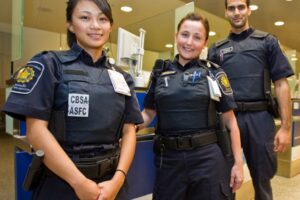[Introduction] As a country's border supervision and management department, the customs and border services are very important. In Canada, which schools offer customs service-related majors? What are the professional skills taught in this major? What are the employment prospects and salaries? How do netizens and UtoCanada view this major? Let's take a look!
Introduction to Canadian Customs Border Service
Customs and border services is a trade and federal law enforcement agency. Trade and global relations play an important role in our economy. Customs services is the national administrative agency and the authority controlling the import and export of goods into and out of the country. They are responsible for collecting tariffs and for controlling the flow of goods, including animals, transports, personal, and hazardous items, into and out of a country. They are also in charge of investigating smuggling, compiling customs statistics and other customs operations. Like the police, this profession has certain security risks and complexity.
Due to the nature of the course and occupation, students will be required to submit a criminal record check. They also need to be in excellent physical condition, and be prepared to participate in fitness training courses. Before applying for this major, applicants must consider whether they have the following qualities:
- Fair judgment
- Keen insight into details
- Strong self-discipline
- Tolerance of Canada’s rich cultural diversity
What knowledge and skills do students learn in the Canadian Customs Border Services major?
Customs Border Services programs are usually offered by colleges in the form of a two-year diploma program. Some schools allow for students to fast track and complete courses within a year. Students in these courses will develop strong critical thinking, observation, leadership and problem-solving skills. Courses may vary, but common subjects include:
- Canadian law and security
- Conflict management
- Fitness
- Immigration
- Sociology
Students will gain technical knowledge on customs, brokerages, immigration and import / export regulations. Courses will also focus on trade agreements, food regulations for inspection, how to identify counterfeit documents and how to conduct investigations. Some programs offer a co-operative work placement, giving students the opportunity to apply what they’ve learned and receive real work experience.

Employment prospects of Canadian Customs Border Services graduates
After graduation, students can work in customs brokerages, private import / export businesses, airports and land border government associations. The Canada Border Services Agency also has many positions for which graduates will be eligible. Salaries for border services and customs jobs vary widely depending on the organization you’re working for, but the average is around $30,000 per year. Entry-level government positions could start as high as $60,000 or more.
More areas of work include: Canadian Border Services Agency (CBSA), casino security, corporate law enforcement, municipal law enforcement, private investigation, private security, security consulting, etc.
》Job description of a customs officer
- Inspect paperwork, luggage, cargo and items to control border crossings and collect payments. Participate in criminal proceedings and prosecution. Confiscate items and goods, document findings and explain reasoning. Interview people to determine their right to enter or leave a country. Interact with the public to explain and enforce customs and laws.
- A customs officer is a specialized law enforcement official who is typically stationed in locations that people and cargo normally enter the country, such as airports, harbors and roads that cross-national borders. Customs officer work to ensure that illegal cargo is not brought into the country, as well as detain and arrest individuals who may be involved in smuggling or are on watch or wanted lists.
- Therefore, customs officers need to have the skills and knowledge to inspect suspicious items, understand relevant laws and regulations, have certain investigative capabilities and accurate judgment, and have excellent physical fitness to deal with emergency situations.
》Salary of CBSA service personnel at the Canadian border: the decisive factors & annual income
According to PayScale statistics, in Canada, the average annual salary of a Border Patrol Agent is $69,000 CAD, with the lower-end salary at $48,863, and the highest can reach $72,190.
The best schools for customs services in Canada
Many colleges in Canada offer two-year diploma programs for the Customs Border Service major. The curriculum is certified by official industry associations and taught by professors and instructors with senior industry experience. The college and the Canadian Border Service Agency (CBSA) cooperate to allow students to participate in field trips and internships organized by the college. The rankings are as follows:
Niagara College
Seneca College
Loyalist College
Humber College
Sault College
Fleming College
Fanshawe College
St. Clair College
Summary: UtoCanada's views on the customs border services major
Working at Border Management sounds like a very prestigious job, but it is actually quite a challenge. In terms of working hours, there may be shifts anytime in a 24-hour a day, which requires strong endurance and a sense of responsibility. In terms of the nature of the job, having strong physical fitness, combat skills, and conflict management skills are necessary. Finally, you need to have a clear knowledge of relevant border and immigration laws and regulations, etc.; as well as supervise the means of transport, goods, luggage items, postal items, and other items entering and exiting the country; collect duties and other taxes, investigating smuggling, and compile customs statistics and other customs operations, etc. If you are interested in customs, trade, and immigration, and are confident enough that you will succeed in this career, this major is for you.
Reference article:

















